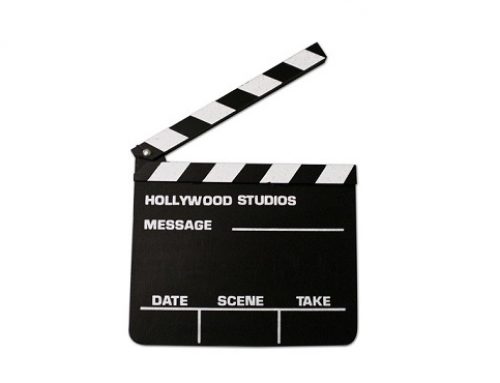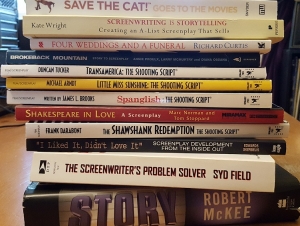How to Decide What Medium Best Suits Your Story
by Renée J. Lukas
It seems like such a basic question. Once you have a killer story idea, what medium do you use to tell it?
Some writers are lucky. They know exactly what type of writer they want to be, and the choice is clear. A novelist says to herself, “Yay! I’ve got my next novel idea!” A screenwriter gets busy outlining the new idea faster than a squirrel gathering nuts for winter.
But a few of us writers who enjoy the benefits of both mediums. . .we struggle. Not only are we frustrated by potential plot holes in our story, but a sometimes excruciating decision at the outset—novel or screenplay? Some of us just like another reason to procrastinate before we even start. You know who you are. . .
Which is more likely to sell—a novel or a screenplay?
Do not labor under the misconception that one medium is easier to sell. It’s a myth that shouldn’t influence your decision, although I’ll admit I’ve thought about this a lot. (I lost some credibility there, didn’t I?) In my defense, I’d heard horror stories from all the screenwriting magazines and websites and forums. In fact, someone once said you’re more likely to get struck by lightning twice than to sell a screenplay to Hollywood. For all the successful screenwriters out there, this isn’t true. To the rest of us, it kind of feels true.
The reality is this: it’s really hard to get a screenplay green-lighted. The cold, hard fact is that you may get it sold, but if the studio never gives it the green light, your script could languish in some storage bin and never see the light of day. With a novel, at least you get your story out there. That is something to consider.
Having said this, it can be extremely difficult to find a publisher or literary agent willing to take on your novel. I got several “good luck in your career” rejection letters before finally landing a publisher. Of course, I’m talking about writers who want to be published the traditional way. If all doors stay shut, there is always Amazon self-publishing. (More on that in a future blog.) So either way, you’re rolling the dice when it comes to whether or not something will sell.
Is your story right for a novel or a screenplay?
We’ve all seen films adapted from novels. Some books lend themselves easily to adaptation for the screen. Some of the best films started with a book—The Help, The Bridges of Madison County, Fried Green Tomatoes, Jurassic Park, Divergent, Twilight, the Harry Potter series. . .While it’s true that some books seem to work on film better than others, I’d say just about anything can be adapted with a little imagination.
Some writers argue that a story told entirely inside a character’s head, something very internal and thought-driven, would be a nightmare to dramatize. But there are ways to show what someone is thinking, and when all else fails, there’s always the voiceover.
Contrary to some screenwriting gurus, voiceovers can work as long as they’re revealing something different than what you’re watching on screen. If a guy picks up a hammer, and the voiceover is: “So I picked up my hammer. . .” that’s obviously silly and unnecessary, right? But in one of the most popular voiceover films, The Shawshank Redemption, as we’re watching sometimes violent acts followed by a bruised Andy DuFresne shuffling through the prison courtyard, Red is talking about Andy’s routine, and the way all inmates learn to adjust to that routine. He’s giving us insight and perspective beyond the brutal actions seen on screen. So the lesson is, don’t dis the voiceover!
Which do you prefer writing—novels or screenplays?
Sometimes the most honest answer to a question is your answer. Even if you write in both mediums, you probably have a favorite. I’ve driven myself crazy, adapting novels I’ve written to screenplays. What drives me crazy is trying to get it right in both mediums. The process of working in both can drive you to a split personality and possibly excessive drinking. Not that I would know this. But you may want to choose just one for your sanity’s sake.
For me, when I want to share a lot of background that’s essential to understanding the story, or delve more deeply into a character’s mind, I tend to choose the novel format. When the first thing that enters my head is some great dialogue or some gripping image that I can totally picture on screen, I opt for the screenplay format. Sometimes I just imagine a story idea as a book or a film and choose which one I think works better. It’s not always rocket science, but a gut instinct, that can lead the way.
This brings us to the most important factor: you! After all, you know yourself best—your strengths, your limitations. Do you go for action-packed scenes with heavy description over dialogue? Or do you revel in fascinating character studies? Are you a mixture of both? In this current world of branding and putting everyone—writers included—into boxes, you have to determine what your overall career goals are, which medium comes more naturally to you, and / or do you have the patience to try and adapt your own prose to a script?
It’s a lot to consider, I know. Ultimately it comes down to you. And since you’re the one who will be spending all the time with your story while you work on it, it’s much better to choose a format you look forward to working in.




